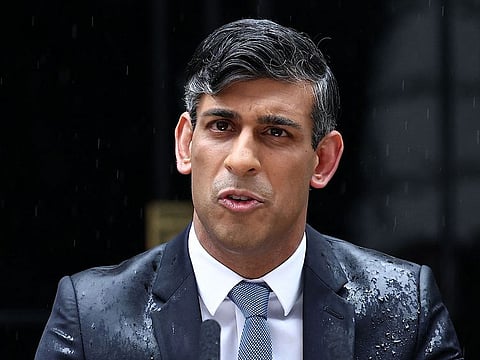UK Elections 2024: Britain’s moment of reckoning is here
UK PM Rishi Sunak decides time is right to call for a general election on July 4

July 4 is Independence Day in the US. In the UK, many Labour voters believe it will mean independence too after 14 years of Conservative rule as Prime Minister Rishi Sunak called a general election for that date.
Struggling to be heard over rock music blaring from nearby Whitehall, he stood in a late afternoon shower to announce the election date and declared: “Now is the moment for Britain to choose its future.”
With his party trailing Labour by 20 percentage points in the opinion polls for at least 15 months, Sunak decided that the timing was right now — even though many of his 330 Conservative MPs would have liked him to cling on until the end of the government’s mandate at the end of the year.
“He’s either very brave or very foolhardy,” political scientist Prof. Sir John Curtice said immediately after the election call. “If the local elections in May are anything to go by, the election campaign won’t be very kind to the Conservatives.”
In those May elections, the Conservatives lost 500 councillors as voters switched to Labour, the Liberal-Democrats, the Greens and Reform, and Sunak and his fellow senior colleagues face an uphill task in returning his party to power for a fifth consecutive term.
The reality is when Boris Johnson led the party to a staggering 80-seat majority in December 2019, much has changed since then — and Sunak replaced Liz Truss who emerged following Johnson’s chaotic leadership during the pandemic and post-Brexit era.
It’s a point that Sunak acknowledged outside 10 Downing Street on Wednesday evening.
Upcoming election campaign
“Over the last five years this country has faced its most challenging times since the Second World War,” he said. “It’s easy to forget the scale of what we’ve been through, the pandemic and then the economic shock from the fallout of Russia’s action in Ukraine.”
But Sunak failed to mention the economic chaos too that has followed in the wake of Brexit — a 7 per cent hit to the UK’s Gross Domestic Product — leaving little resilience when the pandemic and Ukraine tremors followed.
Sunak, as a former Chancellor of the Exchequer and a minister who quickly rose to government ranks for his economic and business prowess, stressed the economy would be the key area of focus in the upcoming election campaign.
The timing of the election poses challenges for the devolved nations of Wales, Scotland and Northern Ireland.
North of the border, the Scottish Nationalist Party’s new First Minister John Swinney is barely two weeks into his role, leading a minority government that is reeling from the resignation of Hamza Youza and criminal charges against a senior party figure.
In Wales, Labour has lost the support of its Plaid Cymru supporters who ended a coalition agreement as new First Minister Vaughan Gething faces questions over a donation to his leadership campaign.
And in Northern Ireland, the former leader of the Democratic Unionist party faces criminal charges on historic sex offences while the Northern Ireland power-sharing government has barely functioned, boycotted by the DUP because of the way Brexit was handled and how the province is treated differently under European Union customs rules. And for the first time in its history, Northern Ireland is being left by a nationalist party that is intent on reuniting the province with the Republic of Ireland to the south.
Also Read: Has the EU reached breaking point?
Also Read: The writing’s on the wall for UK Tories
A sprint or a marathon?
But with all of the questions across the region, the biggest question is why now, so far behind in the polls, with Britons still facing higher mortgage costs and bank interest rates at two-decade highs?
Sunak has staked his reputation on stopping the boats — sending those who migrate illegally to the UK to Rwanda. But £500 million in, not a single flight to Rwanda has yet taken off.
For Labour Leader Sir Keir Starmer, this is a moment that he has been working for since taking over the helm of the party 30 months ago.
A former lawyer and chief of the Crown Prosecution Service, Sir Keir will never win the charisma stakes. Solidly centrist, slightly aloof, he faces the challenge now of converting that 20 point lead in the opinion polls into votes — and seats at Westminster.
Sunak pledged on Wednesday that he “would fight for every vote”. If those opinion polls are to be believed, a lot of those votes are already spoken for — and only one-in-five will be going to Sunak’s party after its four terms, five prime ministers and 14 years.
But now, at least — at last — the race is finally on. Question is, will it be a sprint? Or a marathon?
Sign up for the Daily Briefing
Get the latest news and updates straight to your inbox



